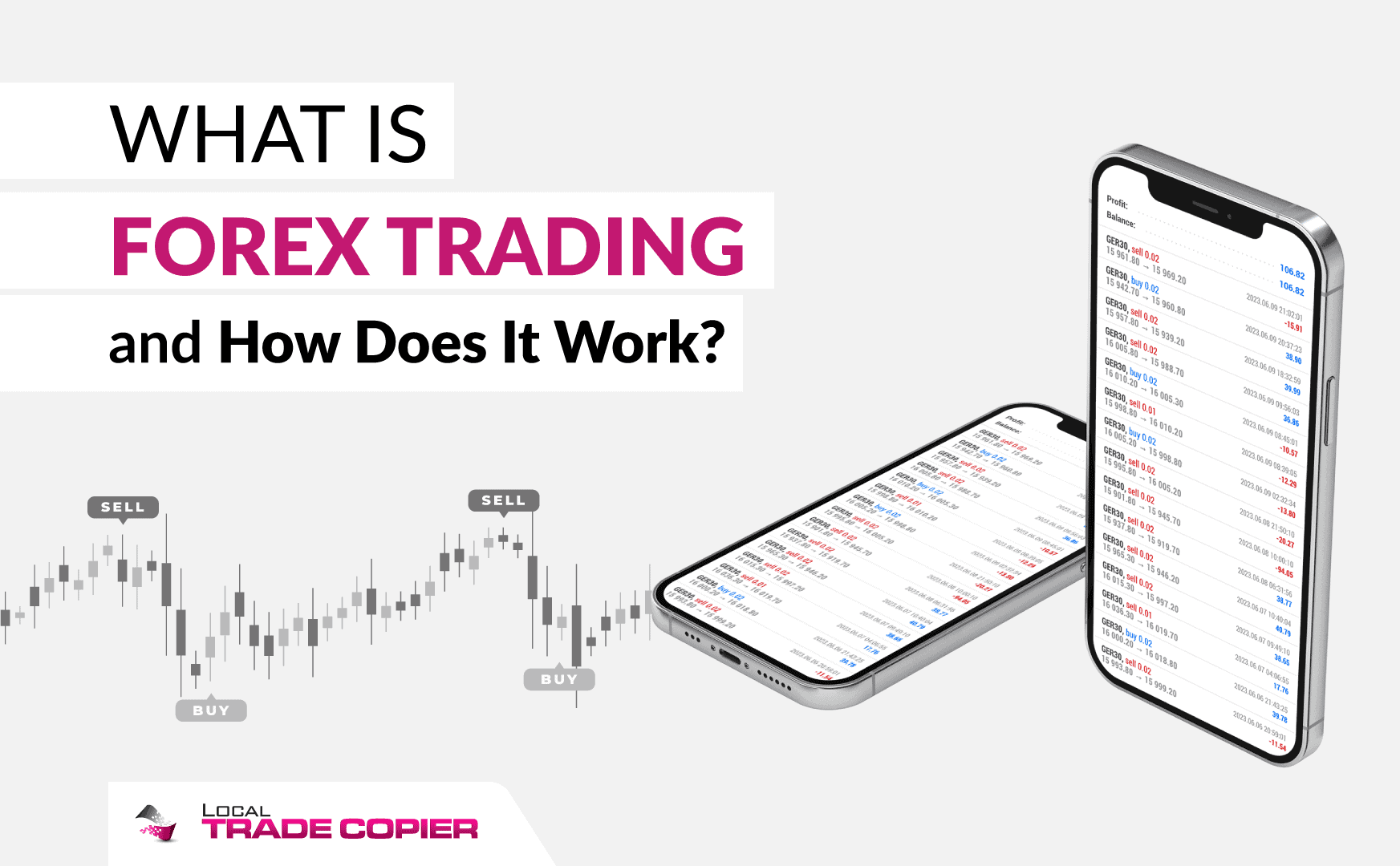
A Beginner's Guide to Forex Trading with MT4copier - Demystifying Currency Exchange Mechanics

A Beginner’s Guide to Forex Trading with MT4copier - Demystifying Currency Exchange Mechanics

If you’ve ever traveled abroad and exchanged your home currency for a foreign one, you’ve participated in the world of forex trading, also known as foreign exchange trading. However, forex trading is much more than just exchanging money for a vacation. It is a dynamic and exciting financial market that attracts individuals and institutions from all around the globe. This article will dive into the fascinating world of forex trading, understand its mechanisms, and explore how it works.
Table of Contents
- Understanding the Forex Market
- Major Participants in the Forex Market
- Key Currency Pairs and Exchange Rates
- The Role of Brokers in Forex Trading
- Fundamental and Technical Analysis
- Understanding Leverage and Margin
- Risks and Benefits of Forex Trading
- Developing a Forex Trading Strategy
- Tips for Successful Forex Trading
- Conclusion
- FAQs
Disclaimer: This post includes affiliate links
If you click on a link and make a purchase, I may receive a commission at no extra cost to you.
Understanding the Forex Market
What is Forex Trading?
Forex trading , or FX trading, is the process of buying and selling currencies to make a profit from the fluctuations in their values. Unlike traditional stock markets that are centralized, the forex market is decentralized, meaning it operates over-the-counter (OTC) through a vast network of financial institutions, brokers, and individuals. The primary centers for forex trading are located in major financial hubs like London, New York, Tokyo, and Singapore.
How Does Forex Trading Work?
At its core, forex trading is based on currency pairs. A currency pair consists of two currencies, with the first one being the base currency, and the second one being the quote currency. For example, in the EUR/USD pair, the Euro is the base currency, and the US Dollar is the quoted currency. The exchange rate of a currency pair indicates how much of the quoted currency is required to buy one unit of the base currency.
Forex trading is accessible 24 hours a day, five days a week, enabling traders to engage in the market at their convenience. Trading occurs electronically through various platforms, providing traders with real-time price data and the ability to execute trades instantly. It is essential to note that forex trading involves significant risks due to the volatility of currency prices. Therefore, traders must employ risk management techniques to protect their capital.
Major Participants in the Forex Market
Commercial Banks
Commercial banks are crucial players in the forex market. They facilitate currency transactions for businesses, individuals, and other financial institutions. Banks provide liquidity to the market and contribute to determining exchange rates through their trading activities.
Central Banks
Central banks , as the monetary authorities of their respective countries, play a significant role in forex trading. They have the authority to regulate monetary policy, including interest rates and money supply, which can influence exchange rates. Central banks also intervene in the forex market to stabilize their national currencies.
Corporations
Multinational corporations engage in forex trading to facilitate international trade and manage currency risks. For example, a company that imports goods from a foreign country may use forex trading to hedge against adverse currency movements that could impact its profitability.
Retail Traders
Individual traders, commonly referred to as retail traders , are the smallest participants in the forex market. Advancements in technology have made it possible for retail traders to access the market through online brokers. Despite their smaller size compared to institutional players, retail traders collectively contribute significantly to the forex market’s trading volume.
Key Currency Pairs and Exchange Rates
Currency Pairs
Forex trading involves a wide range of currency pairs . Major currency pairs, such as EUR/USD, GBP/USD, and USD/JPY, are the most actively traded and have the highest liquidity. Minor and exotic currency pairs involve currencies from smaller economies or emerging markets and generally have lower trading volumes.
Exchange Rate
The exchange rate of a currency pair is influenced by various factors, including economic indicators, geopolitical events, interest rates, and market sentiment. Exchange rates fluctuate constantly, presenting traders with opportunities to profit from these price movements.
The Role of Brokers in Forex Trading
Choosing a Forex Broker
Selecting the right forex broker is critical for a trader’s success. Traders must consider factors such as regulation, trading platforms, fees, spreads, customer support, and available resources for analysis and education.
Types of Forex Accounts
Forex brokers offer various types of trading accounts , catering to traders with different experience levels and trading styles. These may include standard accounts, mini accounts, and even Islamic accounts, which comply with Sharia law.
Fundamental and Technical Analysis
Fundamental Analysis
Fundamental analysis involves evaluating economic indicators, financial reports, and geopolitical events that can influence currency prices. Traders analyze factors like Gross Domestic Product (GDP), employment data, inflation rates, and political stability to make informed trading decisions.
Technical Analysis
Technical analysis relies on historical price charts and patterns to forecast future price movements. Traders use various technical indicators and charting tools to identify trends and potential entry and exit points.
Understanding Leverage and Margin
Leverage allows traders to control larger positions with a relatively smaller amount of capital. While leverage can amplify profits, it also magnifies losses. Traders must exercise caution and use appropriate risk management when utilizing leverage.
Risks and Benefits of Forex Trading
Forex trading offers exciting opportunities for potential profits, but it is not without risks. The volatile nature of the forex market means that traders may experience substantial losses. Understanding and managing these risks is essential for long-term success in forex trading.
Developing a Forex Trading Strategy
Developing a well-thought-out trading strategy is vital for traders to navigate the forex market effectively. A trading strategy should include risk management rules, entry, and exit criteria, and guidelines for trade management.
Tips for Successful Forex Trading
- Education is Key: Invest time in learning about forex trading, including market analysis, trading strategies, and risk management techniques.
- Start Small: Begin trading with a demo account to practice without risking real money. Gradually transition to live trading with a small amount of capital once you gain confidence.
- Stay Disciplined: Stick to your trading plan and avoid impulsive decisions based on emotions.
- Risk Management: Use appropriate position sizing and set stop-loss orders to protect your capital from significant losses.
- Continuous Improvement: Keep a trading journal to review and learn from your past trades, identify strengths and weaknesses, and improve your trading performance over time.
Conclusion
Forex trading is an exciting and dynamic financial market that offers numerous opportunities for traders to profit from currency price movements. Understanding the mechanics of forex trading, conducting a thorough analysis, and employing sound risk management practices are essential for success. As you embark on your forex trading journey, remember to start with a solid trading plan, educate yourself continuously, and practice disciplined trading to achieve your financial goals.
FAQs
1. Is forex trading risky?
Ans. Yes, forex trading involves significant risks due to the volatility of currency prices. Traders should only trade with the capital they can afford to lose and use appropriate risk management strategies.
2. Can I trade forex with a small amount of capital?
Ans. Many forex brokers offer accounts with low minimum deposits, allowing traders to start with a small amount of capital. However, it is essential to manage risk effectively, especially with smaller accounts.
3. How can I learn more about forex trading?
Ans. Various educational resources are available, including online courses, webinars, and educational articles from reputable sources. Invest time in learning and continuously improving your trading skills.
4. What are the best trading hours for forex?
Ans. The forex market operates 24 hours a day, five days a week. The most active trading sessions are during the overlap of major financial centers, such as London and New York.
5. Can I trade forex on my mobile device?
Ans. Yes, many forex brokers offer mobile trading platforms that allow traders to trade on the go using their smartphones or tablets. Mobile trading provides flexibility and convenience for active traders.
Related posts:
- 10 Forex Trading Strategies Based on Economic Indicators
- How to Manage Risks with the Consumer Price Index (CPI) in Forex Trading
- The Importance of Fundamental Analysis in Forex Trading
- Most Effective Strategies for Managing Risk in Forex Trading
Also read:
- [7X + Y = -19
- [Updated] How to Successfully Embed YouTube Playlists via Web Scripts for 2024
- [Updated] The Top Live Streaming Tech Software & Hardware for YouTube Enthusiasts
- 「コマンドラインでWindows 7ファイルを複写する方法」
- 2024 Approved Future of Online Gaming Earnings
- Are You Truly Hidden in Browse's Secret Mode? Debunking Privacy Myths
- Challenges Involve the Difficulty of Attribution and Balancing Security with Maintaining the Openness of the Internet.
- Comment Réaliser Une Image De Reprise Pour Windows 11 : Deux Méthodes Simples
- Discover Why Database Operating Systems Excel in the Cloud Era – Experience with No Cost | ZDNet
- How to Calibrate and Cure Your Xbox Gamepad Drift
- Identifying and Removing Spyware From Your Android Device: A Comprehensive Guide
- In 2024, 20+ Creative Photo Collage Ideas to Light Up Your Life
- In 2024, 3 Ways to Change Location on Facebook Marketplace for Itel P40+ | Dr.fone
- In 2024, All You Need To Know About Mega Greninja For Samsung Galaxy Z Fold 5 | Dr.fone
- Pixiz Masterclass Merging Photography and Motion
- Resolving the Persistent Blue Screen Error (Code 0xC00000E9) on Windows 11
- Top File Sync Solutions for Windows 10: A Two-Step Guide
- Title: A Beginner's Guide to Forex Trading with MT4copier - Demystifying Currency Exchange Mechanics
- Author: Joseph
- Created at : 2025-01-25 16:07:03
- Updated at : 2025-01-31 17:21:03
- Link: https://discover-bytes.techidaily.com/a-beginners-guide-to-forex-trading-with-mt4copier-demystifying-currency-exchange-mechanics/
- License: This work is licensed under CC BY-NC-SA 4.0.